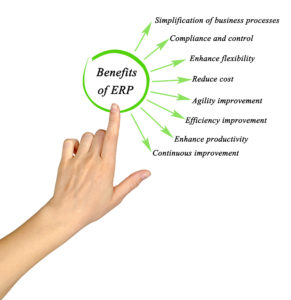Wholesale evolution: choosing the right ERP software
Stuart Hall, Epicor Sales Director for UK and Ireland, examines the history of electrical wholesaling and how the development of ERP (enterprise resource planning) software has helped wholesale businesses to grow and evolve.

Electrical wholesaling in the UK began in the 1880s when G. Binswanger and Company found early success with an innovative way to supply a range of electrical products over the counter to the trade.
Later, in 1914, 24 wholesalers came together to form the Electrical Wholesalers’ Federation (now the Electrical Distributors’ Association) and the industry grew, particularly during the 1920s and 1930s as most homes were provided with electricity.
Needless to say, back then, traditional sales entry and pricing methods were paper based carbon copy invoices and invoice processing tasks completed manually. Of course, this was time-consuming with the potential for human error. Someone had to process every invoice, ensure it was paid, file the documents, record the payment and so on.
Resources, such as pricing reports from industry specialists Luckins, helped to transform the industry. Formed in 1966, the company had to overcome problems that the analogue era presented, including postal strikes, to deliver their service.
Today technology and software is heavily involved in driving the evolution of electrical wholesaling. In fact, research* from Aberdeen Group shows that top performing wholesale distributors invest in technology at twice the rate of their peers and with the right ERP solution, they can increase process integration, enable and encourage growth in margins and significantly improve customer service.
Efficient
In only the last five years, ERP solutions have transformed from what were typically seen as simple order entry systems into crucial business applications that touch and often manage the entire wholesale business. It makes operations extremely efficient and all processes simple and unified. It plays an important role in improving customer interactions and relationships, rebate management and claim support, advanced catalogue management, warehouse management and stock control and the all-important mobile working.
With Epicor BisTrack, for example, managers can immediately see what they’re selling and adjust prices accordingly. Customer data is instantly available to everyone: the sales team can spot which customers haven’t visited for a while or what products are of interest to specific clients.
The right software can build relationships: credit accounts can be viewed quickly and the sales team can note whether a customer is near their limit and can arrange for them to make payments or extend credit limit. Sales teams are no longer just the order point – they have access to valuable customer information which means sales reps can offer customers a focussed, insightful experience taking into account past order history to suggest popular products while respecting their time.
Software solution
BisTrack has been implemented in over 150 distribution businesses across the UK. A software solution like this can bring together the whole business operation of a wholesaler, from sales, purchasing and marketing to quality control and warehouse operations. It enables them to work together rather than separately, providing a total view of the business, a customer or a product and leads to improved consistency and accuracy throughout the business.
Today’s customers are demanding. They expect wholesalers to be automated and analytical, customer focused and able to provide a seamless, connected and unified experience. Choose the right ERP solution for your business and it could be the key to reaching the top of your market with a wholesale business fit for the 21st century.
*http://v1.aberdeen.com/launch/report/research_report/10202-RR-Wholesale-Changes-2015.asp



